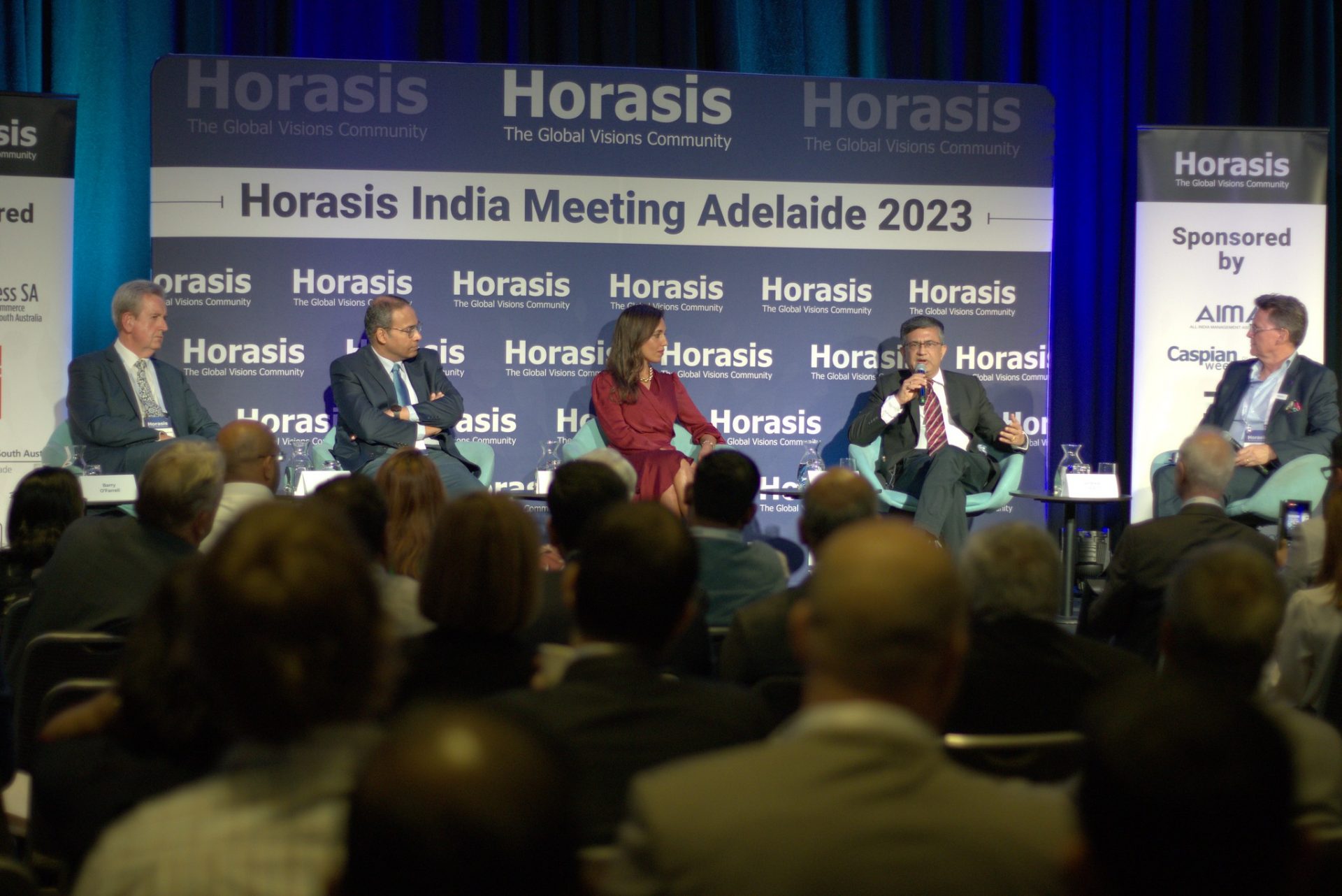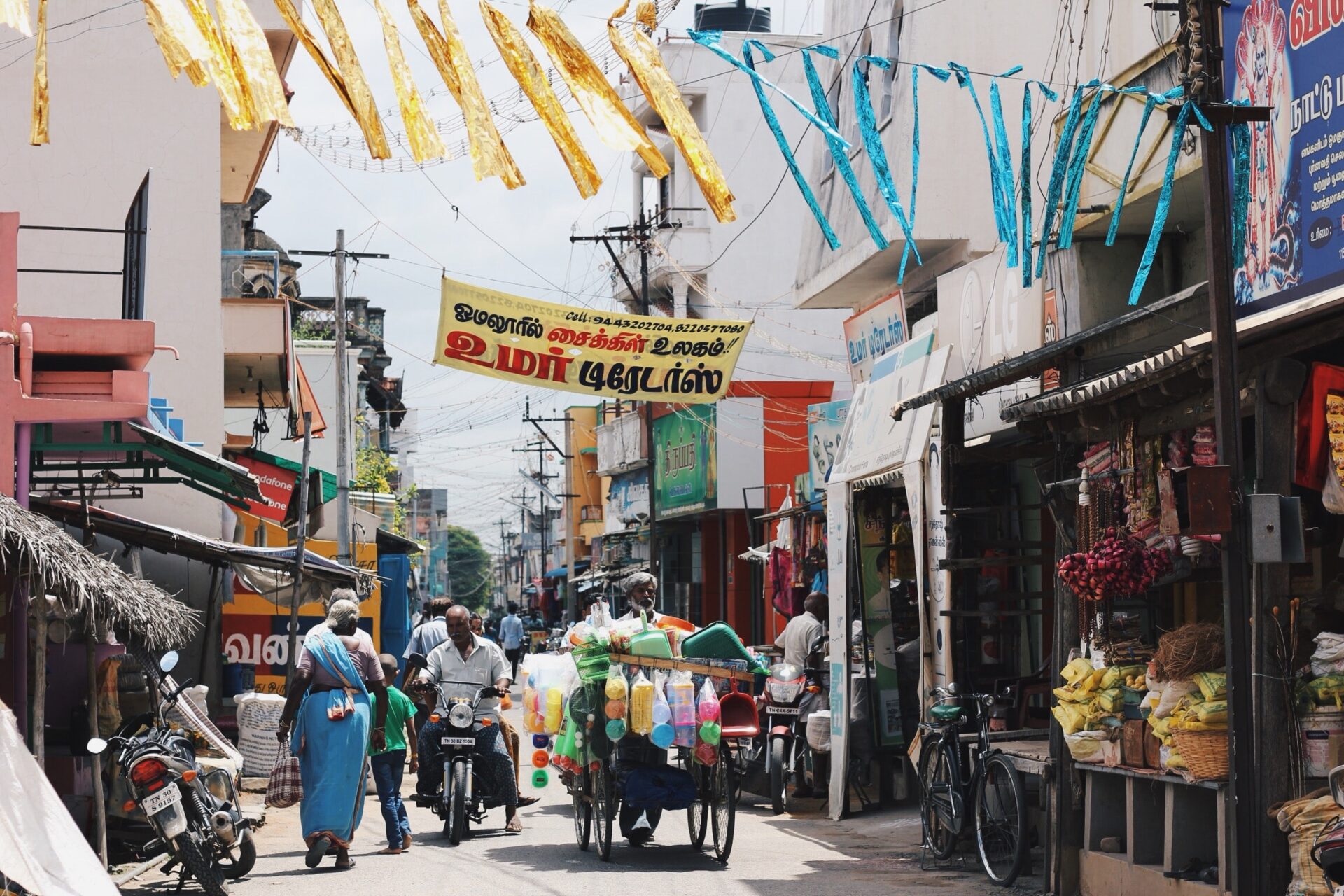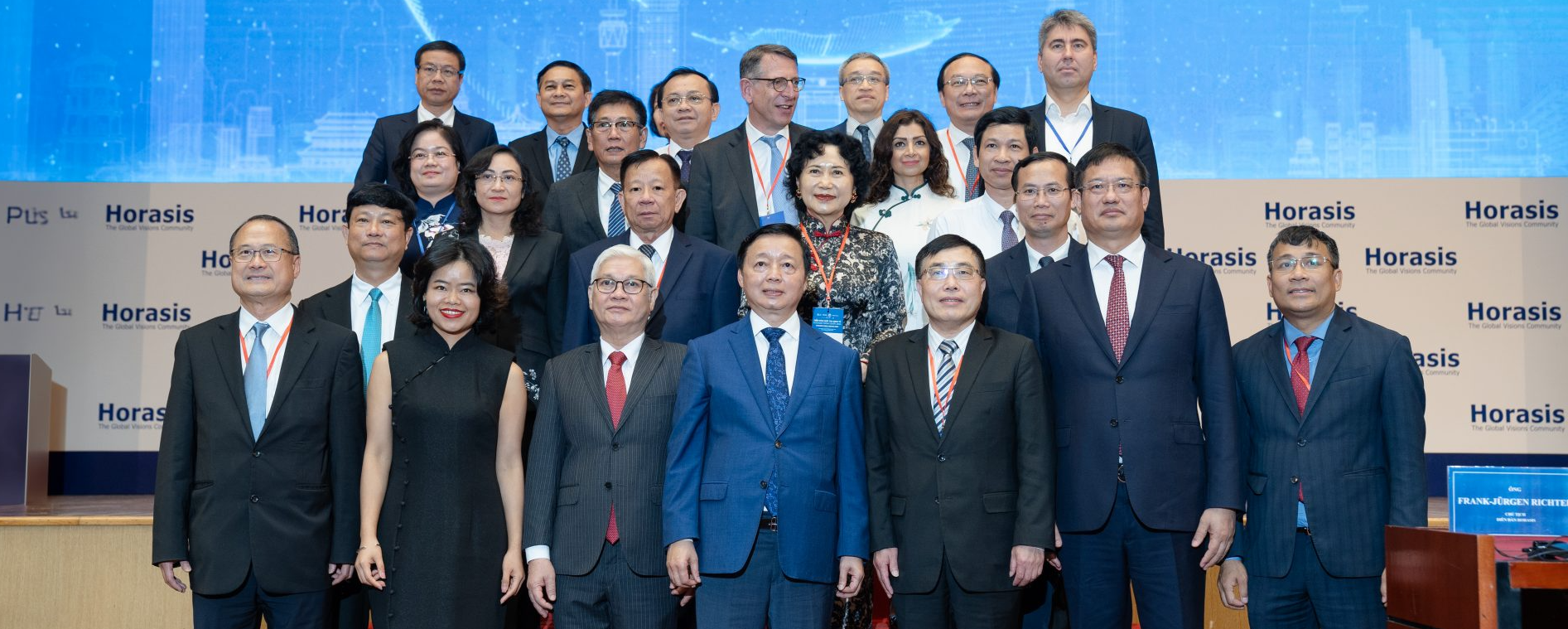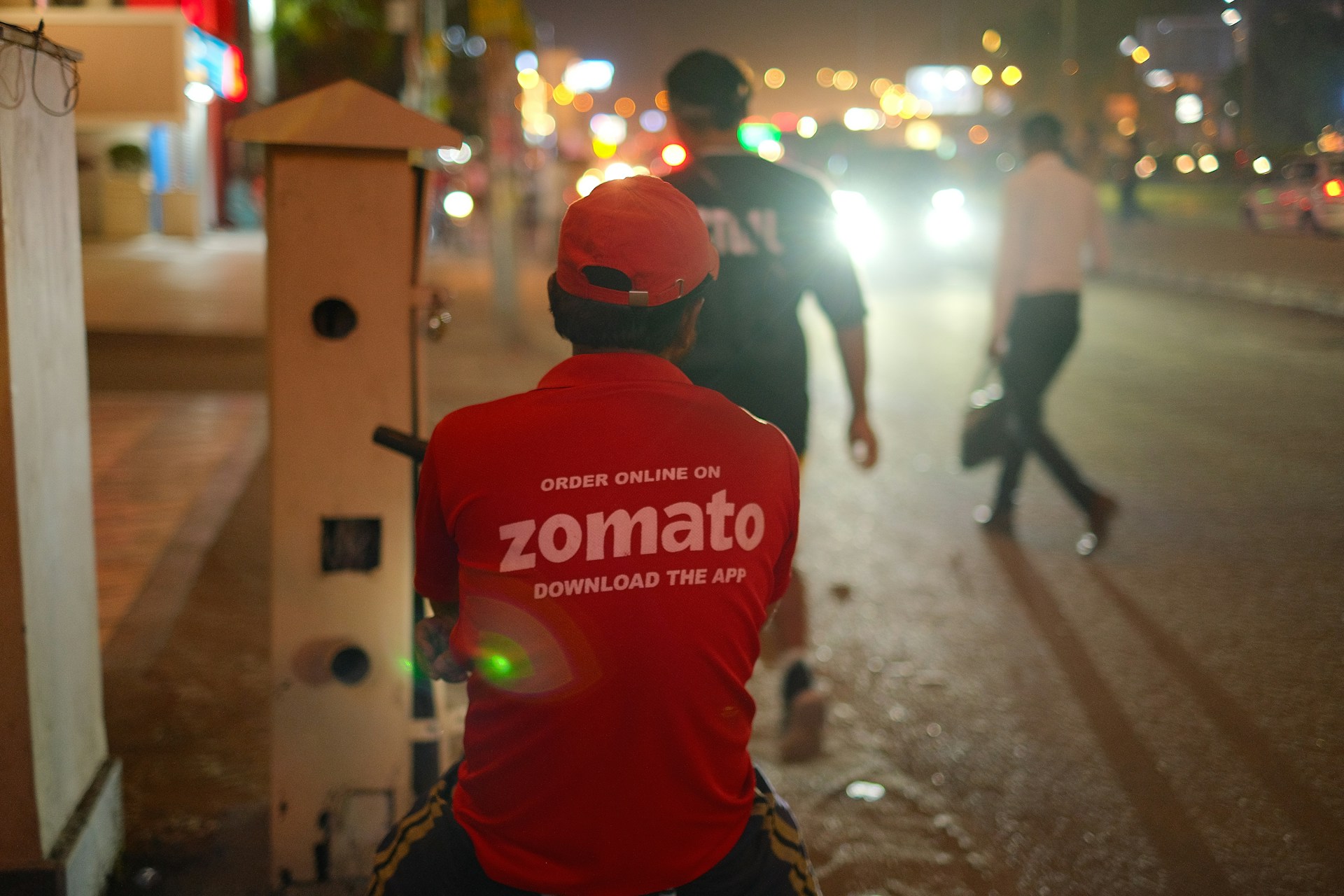Horasis India Meeting 2023 – Summary
The 15th Horasis India Meeting took place in Adelaide, the capital of South Australia over 26-27th November 2023, co-hosted by the government of South Australia and the Confederation of Indian Industry (CII).

Nick Champion, Minister for Trade and Investment, South Australia
Adelaide is Australia’s fifth largest city in the nation; it is regularly classed as one of the top-10 most livable cities in the world with Indians being the third most numerous (after second, the British; and first, Australians.) Nick Champion, Minister for Trade and Investment, South Australia, Australia has noted both India and South Australia embrace hi-tech and high-added value manufacturing which is critical to increasing our economic complexity: “Our leadership in renewables and the emergence of our defense, space, and bio-med sectors will all be of interest to the delegates”. “Australia and India look to leverage the newly signed trade agreement (AIECTA), added Rajneesh, Additional Secretary & Development Commissioner, Ministry of Micro, Small & Medium Enterprises, India.”

Ashishkumar Chauhan, Managing Director & CEO, National Stock Exchange of India (NSE), meeting with participants
Ashishkumar Chauhan, Managing Director & CEO, National Stock Exchange of India (NSE), India said “Indian inflation is expected to decline to 5 percent in 2023 and to 3.6 percent next year, driven by weakening external and domestic demand, easing global supply constraints, and the lagged effects of currency appreciation in some countries. Inflation of 5%, to be in single digits for a country like India was impressive, especially after the fiscal effects of COVID.” Further, GDP per capita income being $2,600 leads India to be the “fourth largest market capitalized country” behind US, China and Japan. Grace Mathew, Managing Director, WeThink Group, Australia said that in an ‘impact’ business, every dollar spent should lead to financial and impact returns. So, your financial goals and impact goals are not in conflict, but actually in harmony and perfectly correlated. R Mukundan, Chief Executive Officer, Tata Chemicals, India observed that the world is facing a tumultuous time – “we entrepreneurs need to navigate towards hope”. KV Rao, Resident Director ASEAN Region, Tata Sons, Singapore concluded that India and Australia are going to remain promoters of globalization.

KV Rao, Resident Director ASEAN Region, Tata Sons, Singapore
Across the broad front of Asia-Pacific, Aditi Haldar, Director, Global Reporting Initiative, India said we all must have dialogue with multi-stakeholder constituencies in making sustainability and transparency a standard practice amongst the South Asian region and the global community. A point restated by Girish Ramachandran, President – Asia Pacific, Tata Consultancy Services, Singapore who said he was a proponent of leading with purpose and giving back to the community, and had leveraged technology to solve some of the most complex societal challenges. “All this is possible with care”, added Zamina Blenkiron, Director, Deloitte Financial Advisory, Australia Sanjeev Gandhi, Chief Executive Officer, Orica, Australia affirmed we do everything we can not to repeat the mistakes of the past. But being merely complacent leads to the dangerous thing of continuing to look into the rearview mirror: “When you are driving and keep looking behind you, that’s when you crash.” Jitesh Shetty, Co-founder and Chief Executive Officer, Credible Innovations, USA concluded that businesses must incorporate ESG considerations into their organizational DNA to meet growing stakeholder expectations.

Nikhil Sawhney, Vice Chairman & MD, Triveni Turbine_ President, AIMA, India
Further, the IT people who will be running GCC hubs (Global Capacity Centers) having 50-70% of the global technology and operations headcount. In moving from being “executors” to becoming “influencers” of the global enterprise strategy, GCCs are providing services relating to cutting edge solutions such as cloud, data analytics, artificial intelligence/machine learning, chip-design, system design, and software development and to more administrative and procedural work. Anuj Kacker, Executive Director and President, Aptech, India advised that investing in knowledge development is probably more critical now than ever for the prosperity of future generations. Yet, Rekha Sethi, Director General, All India Management Association (AIMA), India urged CEOs and Boards to modernize their thinking to accept new processes, techniques and business models as they grow and globalize. According to Nikhil Sawhney, Vice Chairman & MD, Triveni Turbine; President, AIMA, Indian firms are currently developing into true Multinationals – “we are the forefront of globalization”. And the need to maintain efficiency at a level higher than the firm was noted by Anton Roux, Chief Executive Officer, ADC Forum, Australia who placed emphasis on circular economy strategies that aligns with this meeting’s agenda, presenting a compelling avenue to address pressing global challenges in parallel with the COP 28 climate change meeting in the UAE.
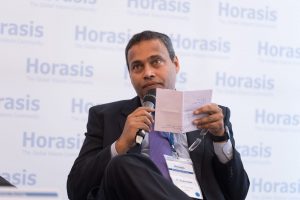
R Mukundan, Chief Executive Officer, Tata Chemicals, India
The Indian diaspora has been the largest overseas group in the world since 2010, and is a powerful resource for India’s government. Of 281m migrants spread around the globe today—generally defined as people who live outside the country where they were born—almost 18m are Indians, according to the latest UN estimates from 2020. Tim Thomas, Chief Executive Officer, Centre for Australia India Relations, Australia affirmed Australia’s relationship with India is closer and more important than ever. Overseas Indians with contacts, language skills and know-how, boost cross-border trade, investment and remittances. These boost India’s GDP which in 2022 had record inward remittances of almost $108bn, around 3% of GDP, more than in any other country. But their leaders must be modest, S. Ramadorai, Former Chairman, National Skill Development Agency (NSDA), India was sure that “Nobody is ever ready for the top job, despite what they may say. As long as there is at least one management layer above you, you are shielded. The management takes the final decisions and carries the ultimate responsibility for those decisions. Once you are at the top, reality hits and you feel the umbilical cord being cut. Now the buck stops with you.”

S. Ramadorai, Former Chairman, National Skill Development Agency (NSDA), India, in skill develpment
Worldwide the pharma industries are stabilizing. Immediately into the COVID pandemic the research firms were allocated massive grants. They quickly created mostly effective vaccines and are still researching cures for the Covid virus. But grants for research and subsequent government purchase of the vaccines increased national debts which have to be repaid, dragging downwards on global GDP.
Bharat Joshi, Chief Executive Officer, J Curve Ventures, India reminded the delegates that in this new post-COVID era we are entering an era where concepts like transparency, efficiency, and safety in the supply chain transform from lofty ideals into achievable realities.
According to Preity Üpala, Founder, The Omnia Institute, India, this transformation is driven by the powerful combination of blockchain technology and forward-thinking corporate partnerships, paving the way for a more secure and transparent future in retail and supply chain management.
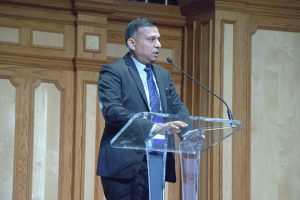
Rajneesh, Additional Secretary & Development Commissioner, Ministry of Micro, Small & Medium, addressing participants
Barry Palte, Chairman, EQ Capital Partners, Australia is passionate for the health of people and our planet, but is very much of the belief that social impact and leading investment returns are not mutually exclusive.
And on similar lines, Ajay Poddar, Managing Director, Synergy Environics, India states that “Environics” is a non-intrusive and scientifically validated practice for correcting negative natural and man-made radiations, for improving the health of people and productivity of organizations.
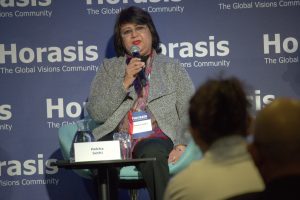
Rekha Sethi, Director General, All India Management Association (AIMA), India
Rajive Kaul, Chairman, Nicco Group; Past President, CII, India summarized the sense of the meeting, stating there was a good opportunity for organizations in Australia in general, and Adelaide in particular, to access new knowledge and visions, grasp the trends and to build and develop socio-economically together with India.

